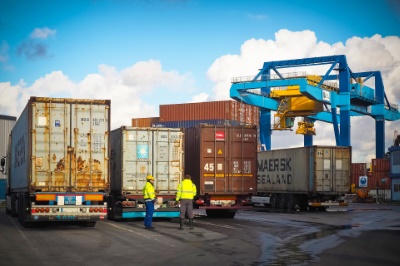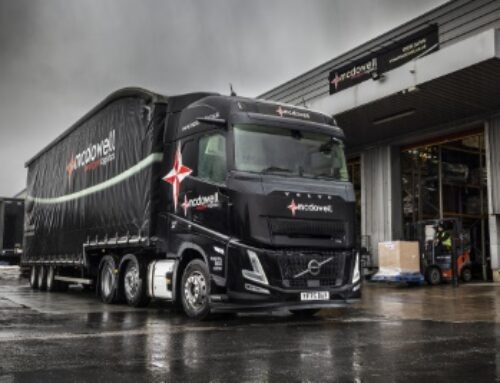‘Cautious optimism’ on Northern Ireland agreement
 The Road Haulage Association (RHA) and Logistics UK have both welcomed the deal between the UK government and the European Union on the Northern Ireland Protocol – but have said further clarity and assurances will be needed around the specifics of the agreement.
The Road Haulage Association (RHA) and Logistics UK have both welcomed the deal between the UK government and the European Union on the Northern Ireland Protocol – but have said further clarity and assurances will be needed around the specifics of the agreement.
The so-called Windsor Framework was agreed by the UK and EU negotiation teams in February and approved by Parliament late last month, prior to official sign-off. It aims to resolve the myriad problems for the logistics sector surrounding the transport of goods between Great Britain (GB) and Northern Ireland (NI), caused by the UK’s exit from the European Union.
Under the agreement, goods from GB destined for NI will travel through a new ‘green lane’, while a separate ‘red lane’ will be for goods subsequently destined for the EU.
It is expected that there will be significant reductions in checks and paperwork for green lane traffic, though these would not be eliminated altogether, the RHA said, particularly where smuggling is suspected. Red lane goods travelling to the EU, including Ireland, would still be subject to the usual checks.
Companies moving products from NI to GB should not have to fill in customs declarations, meanwhile; and there will be new data sharing and labelling procedures.
In addition, parcels will not be subject to full customs declarations, and there will be changes around VAT for some items. Bans on the movement of certain products such as chilled sausages moving from GB to NI will be lifted, as will bans on seed potatoes and certain native British trees.
“Our priority has always been easing the bureaucratic burden on the movement of goods, and over the last two years we have spearheaded the views of the logistics industry on the need for solutions that address members’ concerns,” said RHA.
Late last month, the association commented: “We have welcomed the progress the European Commission and UK government made to reach a deal on the Windsor Framework.
“We have examined the legal text and canvassed our members.
“It’s our view that the Windsor Framework on face value is designed to ease the movement of goods from GB to NI for consumers, but there will still be some bureaucratic processes that will need to be followed.
“There also appears to be some benefit for other sectors, and the feedback we’ve received from members and partners is that as yet, there is a lack of clarity in what’s required for moving freight.
“Operators need assurances that systems and processes will be accessible for businesses of all sizes, and that bureaucracy – especially around groupage movements – will not be prohibitive.
“We will comment further in due course.”
Meanwhile Logistics UK expressed ‘cautious optimism’ over the agreement’s opportunity to ease the passage of goods, following a meeting at the end of February with prime minister Rishi Sunak.
“It is encouraging to see government willing to have these important conversations with businesses in NI, and Logistics UK reinforced with Mr Sunak the need for similar communication among GB suppliers, to ensure trade opportunities running from GB to NI are maximised,” said Nichola Mallon, Logistics UK’s head of trade and devolved policy.
The organisation later reported that logistics businesses trading between GB and NI had expressed “strong support” for the Windsor Framework. 79 per cent of those surveyed welcomed the certainty the new agreement would bring for businesses, but Logistics UK said the sector still had questions about the proposals.
“The agreement is welcome news for our members who drive the NI supply chain with GB, Ireland and the rest of Europe,” said Nichola Mallon.
“Since the UK left the EU, our members in NI have experienced a period of prolonged uncertainty as the details of how to trade with our closest neighbours have been negotiated. When it comes to transporting goods from GB to NI in particular, the process has been protracted and added cost and time to journeys.
“Logistics UK has been pressing politicians for a new ‘green lane’ arrangement which would ensure the smooth flow of trade between NI and GB, and the inclusion of this in the agreement will make trade movements between the two easier.
“More than 55 per cent of our surveyed members agree that the new deal will reduce the administrative and cost burdens on trading between GB and NI, a reduction recognised by two thirds of those trading between NI and Ireland – all of which is excellent news for businesses in the logistics sector and for the wider NI economy.”
However, reservations remained; Ms Mallon reported that 47 per cent of those surveyed were uncertain or doubting the extent to which the agreement would deliver greater affordability for their businesses, and more than 31 per cent concerned as to whether the framework would provide certainty, stability or simplicity for ongoing trading relationships.
She added: “As with any agreement, the devil is in the detail, and we and our members stand ready to assist the government in co-designing the development and application of the implementation stage of this agreement, in a way that works for consumers, business and the NI and GB economies.”













